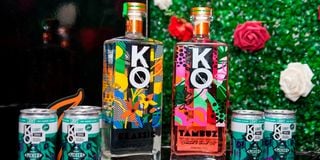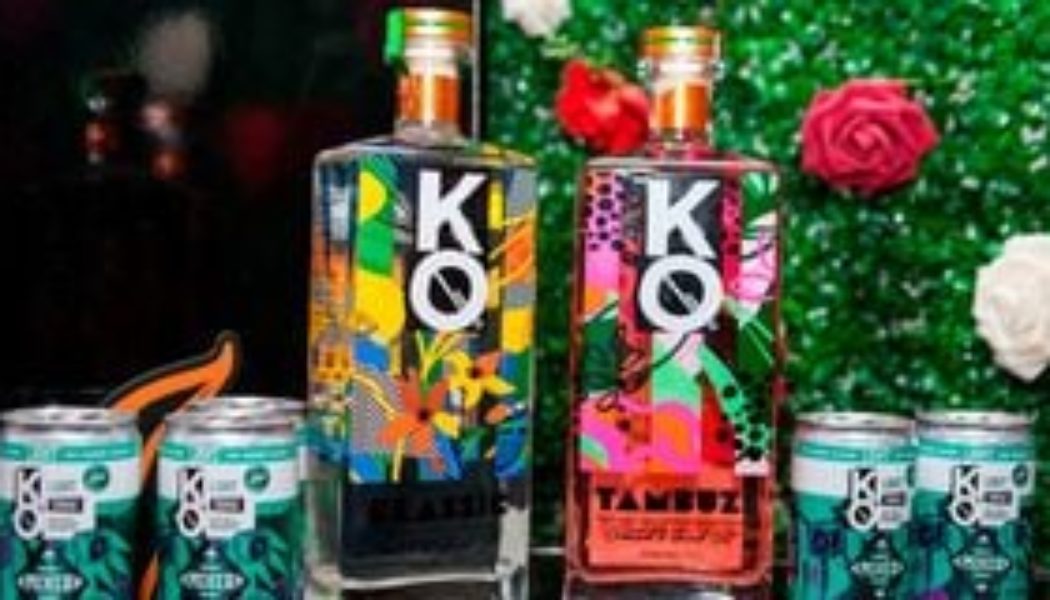A silent revolution has been sweeping across the whole length and breadth of the drinking nation.
The spark that would later explode into what has come to be known as the Gin Revolution was triggered by the closure of pubs and other entertainment spots at the height of the Covid-19 pandemic in 2020.
Cut off from their drinking mates, many imbibers turned to Gilbeys, a cheap but potent gin produced by the East African Breweries Limited (EABL). That marked the beginning of the gin revolution that has held sway even in the post-pandemic period as local producers have come up with more variants of the spirit to cater for the hustlers’ palate.
These gin variants include EABL’s Chrome; Best, produced by the Kenya Wine Agencies Limited (KWAL); and Kenyan Originals (KO) Gin by African Originals. The common feature of these drinks is their popularity among the masses.

Kenyan Original gins on display at a food pairing diner in September 29, 2023.
Photo credit: Billy Ogada | Nation Media Group
But thanks to the Finance Bill, 2024, the gin revolution might fizzle out should a proposed amendment of the Excise Duty Act 2015 sail through the National Assembly.
The National Treasury has proposed to disallow local alcohol producers from claiming refunds on excise tax charged on inputs used to manufacture alcohol including ethanol, glass, sugar and concentrates.
Producers of spirits say this will see them pay excise duty on the inputs as well as the final product, amounting to double taxation.
“The provision will make the local manufacturing of spirits untenable and could force manufacturers to relocate to other countries,” said Eric Kiniti, EABL’s Corporate Relations Director.
“It amounts to double taxation, in violation of taxation principles, and reduces Kenya’s export competitiveness,” added Mr Kiniti.
Ethanol, the raw material used for the production of liquor, will be taxed based on alcohol by volume (ABV) calculation. Ethanol is 96 percent alcohol and four percent water. Currently, manufacturers pay Sh356 per litre of ethanol, which the manufacturers are currently able to claim back.
Should the provision pass, the excise duty will increase to Sh1,600, and manufacturers will now not be able to claim it back and therefore have to pass it on to customers.
Speaking in a local radio station, Mr Kiniti noted that the effect will be to increase excise duty on a 250ml bottle from Sh400 to Sh770.
“It will affect us local manufacturers because we are the ones who will have to pay. If I import the product there is no input cost and the country it’s coming from will not have to pay and claim back.
“We are actually going to affect local manufacturing because it will be easier for us to import and not produce locally because your costs of production are so high and prohibitive that you cannot get a selling price that is competitive in the market,” he added.
In the financial year 2021/22, the government paid excise refunds of Sh1,142,278,736, from Sh1,029,885,870 in the previous year, a report from the Treasury shows.
In the financial year 2022/2023, the government collected Sh18.91 billion in excise duty on wines and spirits, down from Sh19 billion in the previous year.
The drop was largely due to a decline in imported spirits—including brandy, gin, whiskey and rum—due to higher import duty.
Data from the Kenya National Bureau of Statistics (KNBS) shows that imported spirits dropped from an all-time high of 16.3 million litres at the height of the pandemic in 2020 to 13.2 million litres in 2022, reflecting a major shift in drinking habits in the post-lockdown environment.
The drop in imported spirits, which includes mostly premium liquor—such as Whisky—in the post-lockdown period was mainly due to a sharp increase in taxes with Kenya breaking from the other East African Community (EAC) to charge import duty of 35 percent compared to the region’s 25 percent in July 2022, said Eric Githua, the chairperson for the Alcoholic Beverages Association of Kenya (Abak).
Additionally, in the 13 months to November 2021, excise duty on spirits was increased three times, explaining the drop in imported spirits.
The government’s thinking has been that increased import duty will incentivise local production. And while this has not worked for spirits such as Scotch whiskey, Tequila, Champagne and Bourbon, which are protected by a clause in the World Trade Organisation (WTO) agreement which forbids their manufacture in other countries, it has spurred the local production of gin and vodka.
Most of the spirits produced in Kenya include the easy-to-distill gin and vodka, which are also affordable to most Kenyans. They are produced from ethanol which comes from molasses, a by-product of sugar production.
In its annual report for 2021, the EABL noted that it deliberately prioritised popularising the gin and tonic ritual.
“The approach worked and the results unequivocally speak to this. During the same period, we awakened the giant notably; Gilbey’s special dry gin is a leading light in the spirits category,” said EABL.
Affordability of the locally produced gin spirits has endeared them to millions of revelers who can’t afford expensive imported spirits such as Scotch whiskies.
There are fears that higher taxes will push Kenyans to illicit liquor and counterfeits.
The government has since unearthed a syndicate of illegally exported molasses, mostly to Uganda, which ultimately feeds the market for counterfeit alcoholic drinks and illicit traditional brews such as chang’aa. The illegally exported molasses is smuggled back into the country as ethanol.
The illicit alcohol trade is valued at around Sh67 billion, with the country’s revenue loss estimated at Sh66 billion, a June 2023 study by Euromonitor, a market research company, revealed.









